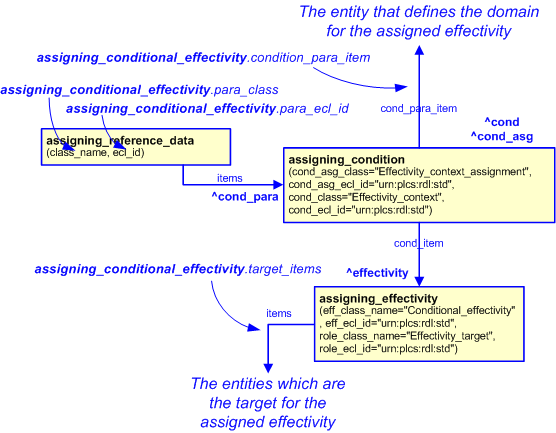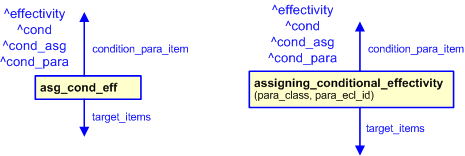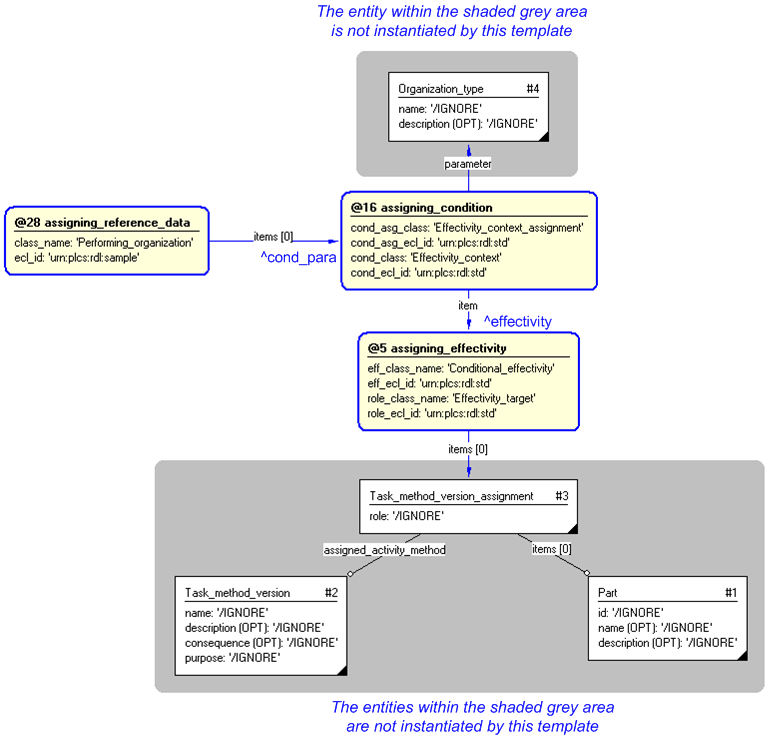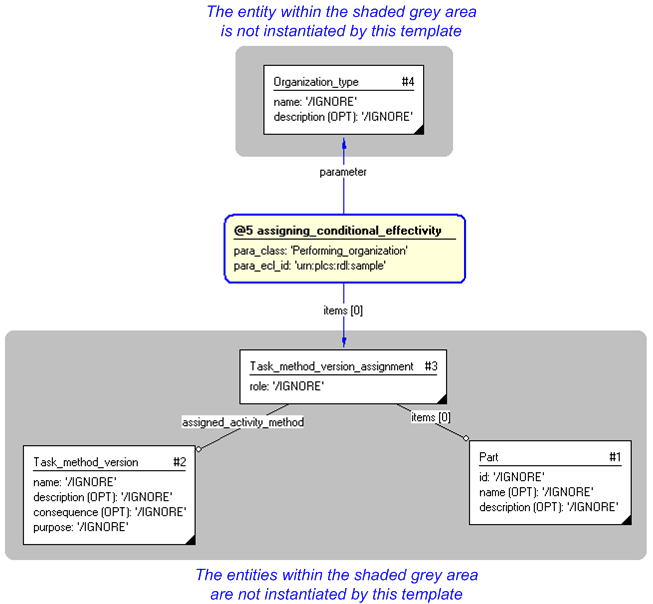| Template:— assigning_conditional_effectivity (asg_cond_eff) |
Date: 2009/09/28 10:52:31
Revision: 1.15
|
This section specifies the template assigning_conditional_effectivity.
NOTE
An explanation of a template and the associated instantiation path is
provided in the
Template overview
section.
The EXPRESS-G diagram in
Figure
1
shows the templates and EXPRESS entities that are required
to represent the template
"assigning_conditional_effectivity".
The text highlighted in blue shows the template parameters.
Figure 1 — An EXPRESS-G representation of the Information model for assigning_conditional_effectivity
The graphic for the template to be used in other EXPRESS-G diagrams
is shown in Figure
2
below.
Figure 2 — The graphical representation of the assigning_conditional_effectivity template
The following input parameters are defined for this template:
The following classes and their sub-classes can be used:
The items which are the target for the assigned effectivity, i.e. the items
which are subject for restricted usage.
The item which defines the domain in which the @target_items are effective.
The following reference parameters are defined for this template:
Allow the
Effectivity
entity instantiated in this path to be referenced when this template is used.
Note: The
Effectivity
entity can be referenced in a template path by:
%^target = $assigning_conditional_effectivity.effectivity%
where
target
is the parameter to which the
Effectivity
is bound.
Allow the
Condition
entity instantiated in this path to be referenced when this template is used.
Note: The
Condition
entity can be referenced in a template path by:
%^target = $assigning_conditional_effectivity.cond%
where
target
is the parameter to which the
Condition
is bound.
Allow the
Condition_assignment
entity instantiated in this path to be referenced when this template is used.
%^target = $assigning_conditional_effectivity.cond_asg%
Allow the
Condition_parameter
entity instantiated in this path to be referenced when this template is used.
%^target = $assigning_conditional_effectivity.cond_para%
The instantiation path shown below specifies the entities that are to be
instantiated by the template.
A description of templates and the syntax for the instantiation path is
provided in the
Templates Help/Information section.
-- Set up the effectivity entity /
assigning_effectivity(
items=@target_items,
eff_class_name='Conditional_effectivity',
eff_ecl_id='urn:plcs:rdl:std',
role_class_name='Effectivity_target',
role_ecl_id='urn:plsc:rdl:std')/
%^effectivity = $assigning_effectivity.effectivity%
-- Assign the parameter defining the effectivity domain to the condition parameter item -- and assign the reference parameter ^effectivity from the instantiated assigning_effectivity -- template to the condition item /
assigning_condition(
cond_item=^effectivity,
cond_para_item=@condition_para_item,
cond_asg_class='Effectivity_context_assignment',
cond_asg_ecl_id='urn:plcs:rdl:std',
cond_class='Effectivity_context',
cond_ecl_id='urn:plcs:rdl:std')/
%^cond = $assigning_condition.cond%
%^cond_asg = $assigning_condition.cond_asg%
%^cond_para = $assigning_condition.cond_para%
-- Assign the External_class in the reference data library -- being used to determine type of condition parameter /
assigning_reference_data(
items=^cond_para,
class_name=@para_class,
ecl_id=@para_ecl_id)/
The instance diagram in Figure
3
shows an example of the EXPRESS entities and templates that are instantiated by the template:
/assigning_conditional_effectivity(para_class='Performing_organization', para_ecl_id='urn:plcs:rdl:sample', target_items='#3', condition_para_item='#4')/
(an illustration of the consolidated assigning_conditional_effectivity template is shown in
Figure
4 below.)
Figure 3 — Entities instantiated by assigning_conditional_effectivity template
The instance diagram in
Figure
4
shows the graphic symbol for the template that is to be
used in other instance diagrams. The example template is:
/assigning_conditional_effectivity(para_class='Performing_organization', para_ecl_id='urn:plcs:rdl:sample', target_items='#3', condition_para_item='#4')/
Figure 4 — Instantiation of assigning_conditional_effectivity template
Characterizations
No common characterizations of the template
assigning_conditional_effectivity
have been identified. However, the ISO 10303-239 EXPRESS model
may enable other assignments to the entities instantiated by the template.




